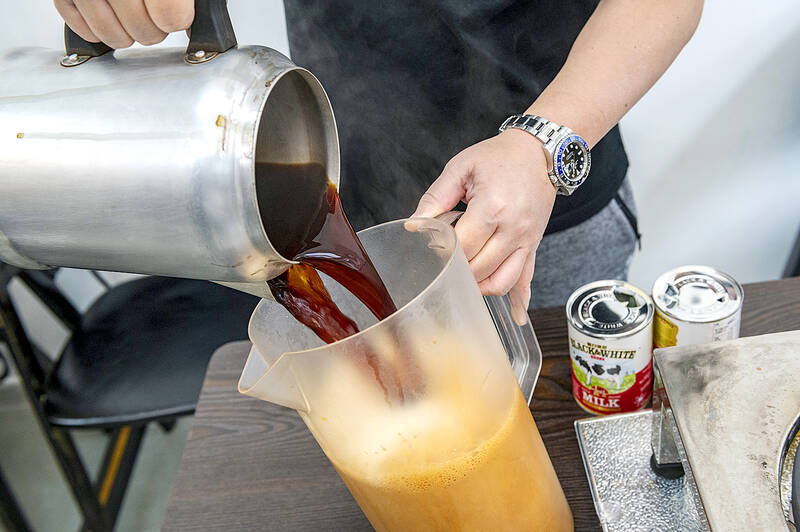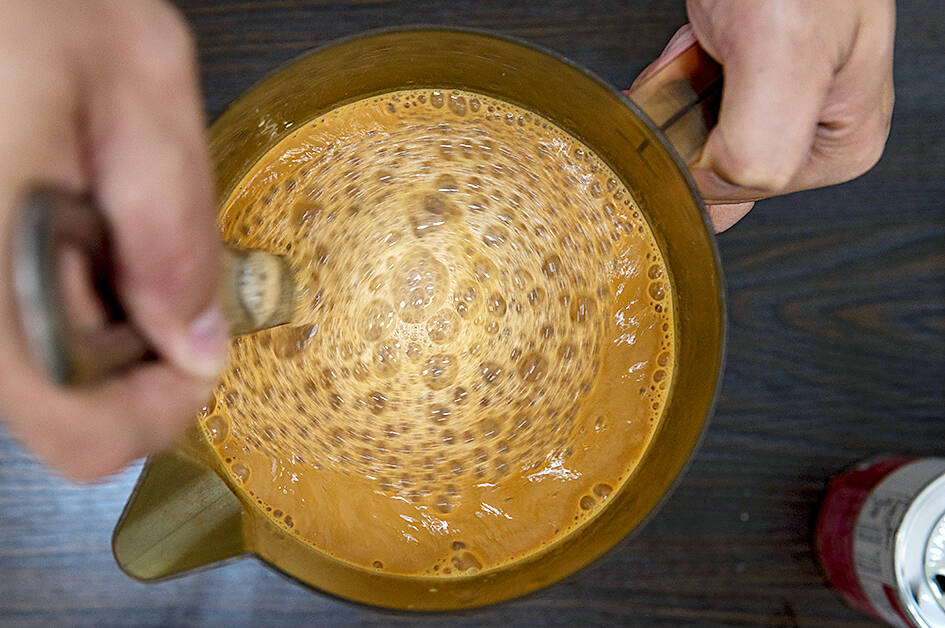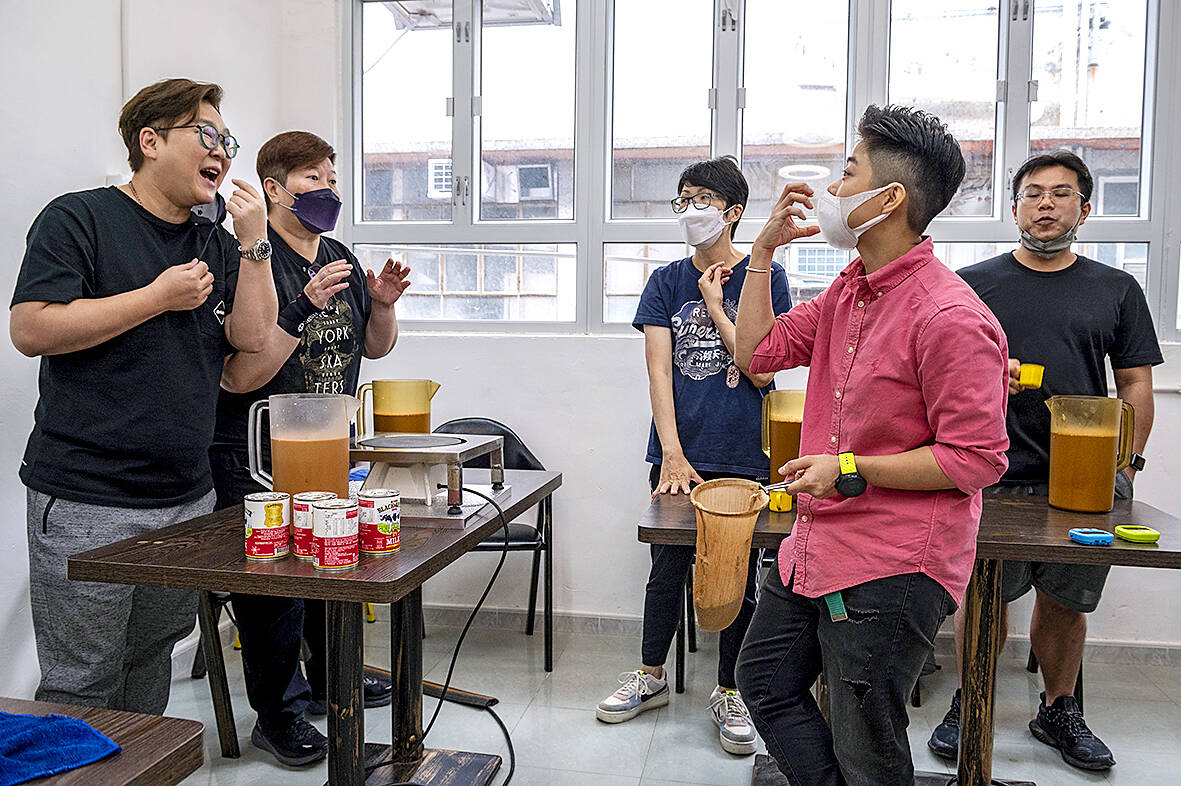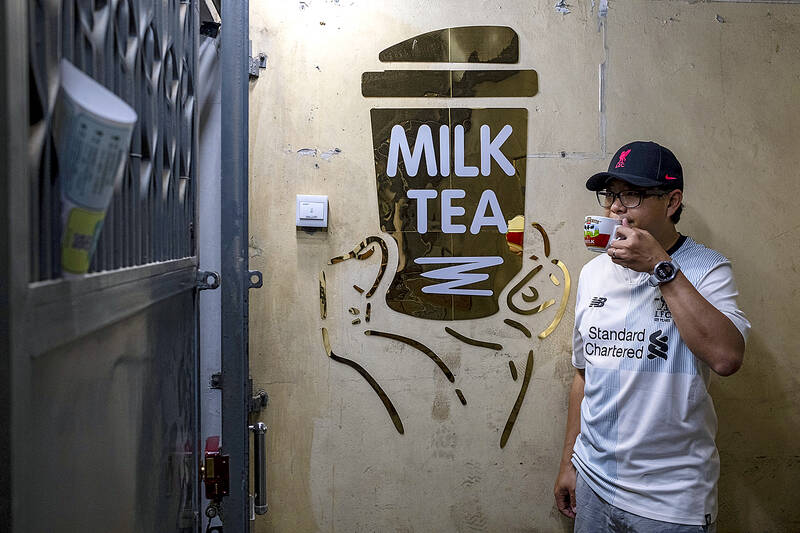In London, Wong Wai-yi misses the taste of home.
A year ago, the 31-year-old musician was in Hong Kong, earning a good living composing for TV and movies and teaching piano. Today, she makes about half as much in London working part-time as a server alongside her musical pursuits. She chose the job in part because staff meals allow her to save money on food.
It’s a difficult adjustment. And Wong, who left Hong Kong with her boyfriend in January, has turned to a beloved hometown staple to keep her grounded: milk tea. She brings the beverage to parties with Hong Kong friends and gives bottles to co-workers as gifts.

Photo: AP
“It’s like reminding myself I am a Hong Konger. It will be fine as long as we are willing to endure the hardships and work hard,” said Wong, who left as part of an exodus that began after Beijing passed a law in 2020 that curtailed civil liberties.
HOMETOWN FLAVOR
As tens of thousands leave Hong Kong for new lives abroad, many are craving a flavor from childhood that’s become a symbol of the city’s culture: the sweet, heavy tea with evaporated milk that’s served both hot and cold at diner-like restaurants called cha chaan tengs. Workshops are popping up to teach professionals to brew tea like short-order cooks, and milk tea businesses are expanding beyond Chinatowns in Britain.

Photo: AP
In Hong Kong, milk tea is an unassuming beverage, something you use to wash down sweet French toast off a plastic plate. It’s so beloved that members of Hong Kong’s protest movement have called themselves part of a “Milk Tea Alliance” with activists from Taiwan, Thailand and Myanmar, who drink similar beverages.
Following a law that silenced or jailed most political opposition, over 133,000 residents have secured a special visa that allows them to live and work in the UK and apply for British citizenship after six years. Official figures have not been released on how many have gone but most recipients are expected to do so, given the visa’s cost.
The pathway was introduced last year in response to China’s 2020 enactment of the National Security Law, which the UK called “a clear breach” of the 1984 Sino-British Joint Declaration. The declaration included a promise to retain the former British colony’s rights and freedoms for 50 years after it was returned to China’s rule in 1997.

Photo: AP
Exiled activist Lee Ka-wai said that immersing himself at a Hong Kong-style cafe in London with a cup of milk tea was a “luxury.”
The 26-year-old fled Hong Kong in March last year out of fear of being arrested. He is wanted by the city’s anti-graft body for allegedly inciting others to boycott the legislative election in December last year. As an asylum seeker in Britain, he is not allowed to work and is living on savings.
Even if the taste is right, he said, the feel of a cha chaan teng and the sounds of customers chatting in Cantonese cannot be replicated.

Photo: AP
“It’s strange because I can feel a sense of home overseas. But it also has another meaning — there’s something that cannot be replaced,” he said. “What we long for most is to go home and see a better Hong Kong. But we can’t.”
Some emigrants, like Eric Tam, a 41-year-old manager at an insurance company, enroll in milk tea lessons before leaving. Visiting Hong Kong this month, he stocked up on a milk tea blend, a recipe that evolved from British teas in the colonial era.
While tea is easy to find in England, he said, the taste isn’t the same: “British milk tea is just watery milk,” said Tam.
Before moving to Liverpool with his wife and two younger daughters in June, Tam signed up for lessons at the Institution of Hong Kong Milk Tea. The two-year-old organization teaches students skills like pouring tea back and forth between a kettle and a plastic container to enhance its flavor before mixing it with evaporated milk.
Yan Chan, the school’s founder, estimated that about 40 percent of the 2,000 people who have studied with her were planning to emigrate.
HONG KONG IDENTITY
Milk tea only began to emerge as a symbol of the Hong Kong identity over the last 15 years, said Veronica Mak, associate professor at the sociology department of Hong Kong Shue Yan University.
Mak said that many young people began to think about Hong Kong identity after the government removed Queen’s Pier, a landmark from the city’s colonial past, in 2007. Childhood memories, marketing and a fashion for localism came together to make milk tea a totem of Hong Kong culture.
“When you ask young people what kind of milk tea they like to drink, they will tell you it’s the bubble milk tea,” she said, referring to a drink from Taiwan. “But when you come to the identity part … they will not say the bubble tea but the local style milk tea.”
Most milk tea lovers interviewed said that milk tea isn’t political. But Tam said it’s a form of silent resistance.
“We can choose to preserve the culture that we want to keep. It cannot be destroyed even if other people try,” he said.
Contemporary Asian tea culture is catching on globally. Outside Chinatowns, at least five Hong Kong-style milk tea brands have emerged over the past two years in Britain. One set up a pop-up cafe in the trendy London neighborhood of Shoreditch in September, attracting Londoners and tourists as well as Hong Kong emigres.
Eric Wong, a tea wholesaler, began selling bottled milk tea last year after moving to the UK, and offers milk tea workshops. He said he’s making 500 to 1,000 bottles of milk tea a week, and his south London business broke even after about six months. His Trini Hong Kong Style Milk Tea products are available online and at major Asian supermarkets.
The taste of home can provoke strong emotions. A young woman from Hong Kong once shed tears after tasting his tea, Wong said.
Between people planning to leave and growing interest in local culture, Chan is busy. On Nov. 3, nine people attended her class, none of whom had plans to emigrate.
Cooking enthusiast Dennis Cheng had a class with her in late September and practiced the signature pouring while preparing to leave Hong Kong with his wife and children.
He said the taste will help remind him of Hong Kong and friends back home.
“This may help me feel emigrating overseas isn’t really that sad,” he said. “It’s just that I need more time to adapt to it.”

Taiwan Power Co (Taipower, 台電) and the New Taipei City Government in May last year agreed to allow the activation of a spent fuel storage facility for the Jinshan Nuclear Power Plant in Shihmen District (石門). The deal ended eleven years of legal wrangling. According to the Taipower announcement, the city government engaged in repeated delays, failing to approve water and soil conservation plans. Taipower said at the time that plans for another dry storage facility for the Guosheng Nuclear Power Plant in New Taipei City’s Wanli District (萬里) remained stuck in legal limbo. Later that year an agreement was reached

What does the Taiwan People’s Party (TPP) in the Huang Kuo-chang (黃國昌) era stand for? What sets it apart from their allies, the Chinese Nationalist Party (KMT)? With some shifts in tone and emphasis, the KMT’s stances have not changed significantly since the late 2000s and the era of former president Ma Ying-jeou (馬英九). The Democratic Progressive Party’s (DPP) current platform formed in the mid-2010s under the guidance of Tsai Ing-wen (蔡英文), and current President William Lai (賴清德) campaigned on continuity. Though their ideological stances may be a bit stale, they have the advantage of being broadly understood by the voters.

In a high-rise office building in Taipei’s government district, the primary agency for maintaining links to Thailand’s 108 Yunnan villages — which are home to a population of around 200,000 descendants of the Chinese Nationalist Party (KMT) armies stranded in Thailand following the Chinese Civil War — is the Overseas Community Affairs Council (OCAC). Established in China in 1926, the OCAC was born of a mandate to support Chinese education, culture and economic development in far flung Chinese diaspora communities, which, especially in southeast Asia, had underwritten the military insurgencies against the Qing Dynasty that led to the founding of

Artifacts found at archeological sites in France and Spain along the Bay of Biscay shoreline show that humans have been crafting tools from whale bones since more than 20,000 years ago, illustrating anew the resourcefulness of prehistoric people. The tools, primarily hunting implements such as projectile points, were fashioned from the bones of at least five species of large whales, the researchers said. Bones from sperm whales were the most abundant, followed by fin whales, gray whales, right or bowhead whales — two species indistinguishable with the analytical method used in the study — and blue whales. With seafaring capabilities by humans